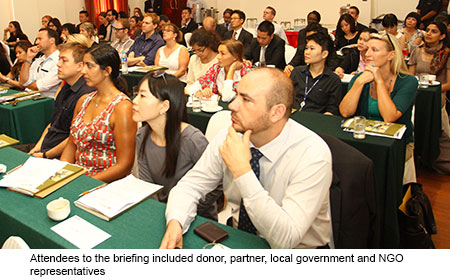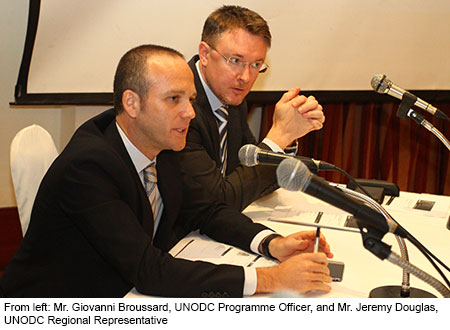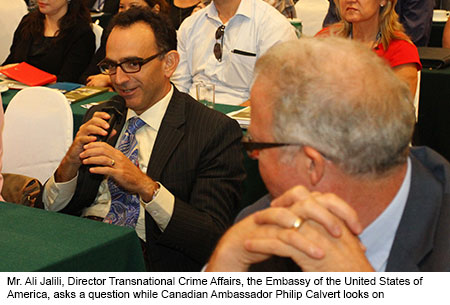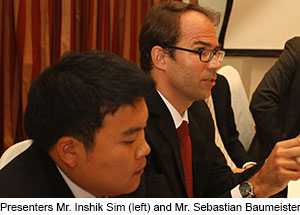
Bangkok (Thailand), 2 May 2013 - The new UNODC regional programme for Southeast Asia and the Pacific will support governments as they respond to the challenges posed by transnational organized crime, said Mr. Jeremy Douglas, UNODC Regional Representative for Southeast Asia and the Pacific, at a donor briefing on UNODC's report, Transnational Organized Crime in East Asia and the Pacific - A Threat Assessment.
The report is the first comprehensive study of transnational organized crime threats in East Asia and the Pacific. It details the criminal flows involved and provides estimates of annual revenues generated for criminal groups by activities related to human trafficking and migrant smuggling, illicit drugs (heroin and methamphetamine), environmental crime (wildlife, wood products, e-waste and ozone-depleting substances), and counterfeit consumer goods and fake medicines.
The report estimates that these Illicit markets in East Asia and the Pacific earn organized criminal groups nearly USD 90 billion a year - an amount roughly equal to twice the GDP of Myanmar, eight times that of Cambodia and 12 times that of Lao PDR.
At the briefing, UNODC Regional Office experts presented the main findings of the report to over 60 attendees, including representatives from embassies, partners, UN agencies, NGOs and Thailand's Ministry of Foreign Affairs, Department of Special Investigation, and Royal Thai Police, among others.
Mr. Douglas reviewed the implications for development in the region and announced consultations leading to a new UNODC Regional Programme for Southeast Asia and the Pacific.

"We have already begun discussions with ASEAN Member States on how we proceed to develop a new, integrated Programme for Southeast Asia and the Pacific," said Mr. Douglas. "We have presented to the Thai Ministry of Foreign Affairs, and look forward to involving all donor and partner states in this process. We plan to brief governments on the first draft of the Programme by September, and expect to have a fully developed Programme in place shortly thereafter."
In addressing environmental crimes, the first of four thematic areas, Mr. Giovanni Broussard highlighted that the threat of environmental crimes is significant and goes beyond borders, jeopardizing our global environmental heritage - though frequently these crimes are dealt with lightly under local legislation - if at all.
"There has been inadequate response to environmental crimes compared to other crimes in the region, which can lead to serious consequences for the planet and human development," said Mr. Broussard. "Environmental crimes generate an estimated USD 23 billion annually, but very few environmental crime offenders are ever prosecuted."
Criminal organizations still profit significantly through the trafficking of illicit drugs, in the form of heroin and amphetamine-type stimulants (ATS), and accounting for USD 31.3 billion - nearly one-third of the illicit flows reviewed.

Mr. Shawn Kelley discussed the resurgence of opium cultivation in the region in Myanmar and Lao PDR. Coupled with the rising production, trafficking and use of methamphetamine, illicit drugs pose a significant health, human security and law enforcement concern. Mr. Kelly also noted increased seizures of methamphetamine produced in Nigeria and Iran, and the growing role of heroin from Afghanistan.
Pointing out the human costs of human trafficking and migrant smuggling, Mr. Sebastian Baumeister urged attendees to look beyond statistics.
"Migrant smuggling is not just an illicit service industry. It also puts migrants at risk of exploitation or losing their lives. It's also a deadly business. While we are able to calculate the profits of criminal organizations, it is difficult to quantify the psychological and physical damage that is done to the victims of these crimes."
 Counterfeit consumer goods and fake medicines make up one-third of the crime flows studied in the report. Although many consider these to be "soft forms of crime", they cost governments revenue, are linked to other forms of transnational organized crime and impact local and global health, said Mr. Inshik Sim, UNODC Criminal Justice Researcher. "The use of fraudulent anti-malarial medicines has two effects: One, it makes people more sick. Second, it leads to anti-malarial resistance that can threaten the lives of millions in Africa and Asia," said Mr. Sim.
Counterfeit consumer goods and fake medicines make up one-third of the crime flows studied in the report. Although many consider these to be "soft forms of crime", they cost governments revenue, are linked to other forms of transnational organized crime and impact local and global health, said Mr. Inshik Sim, UNODC Criminal Justice Researcher. "The use of fraudulent anti-malarial medicines has two effects: One, it makes people more sick. Second, it leads to anti-malarial resistance that can threaten the lives of millions in Africa and Asia," said Mr. Sim.
"No country is immune to the threat posed by transnational organized crimes," said Mr. Douglas in his concluding remarks. "These illicit activities are a threat to security, good governance, human rights and sustainable development. The international community must understand this problem from both security and development perspectives. We need governments' help to gather data, share it, and create an effective response. Future reports of this nature will only get better."